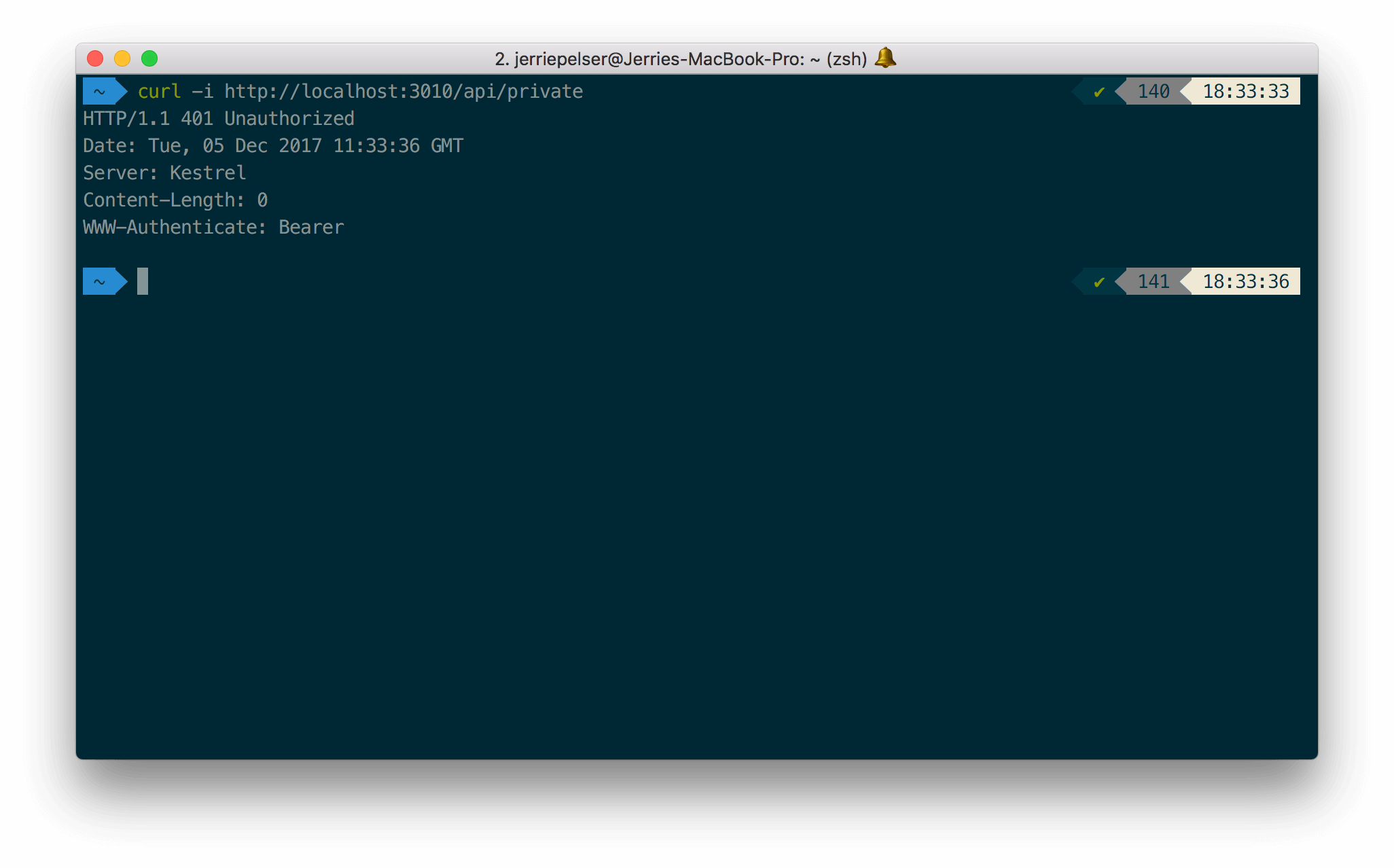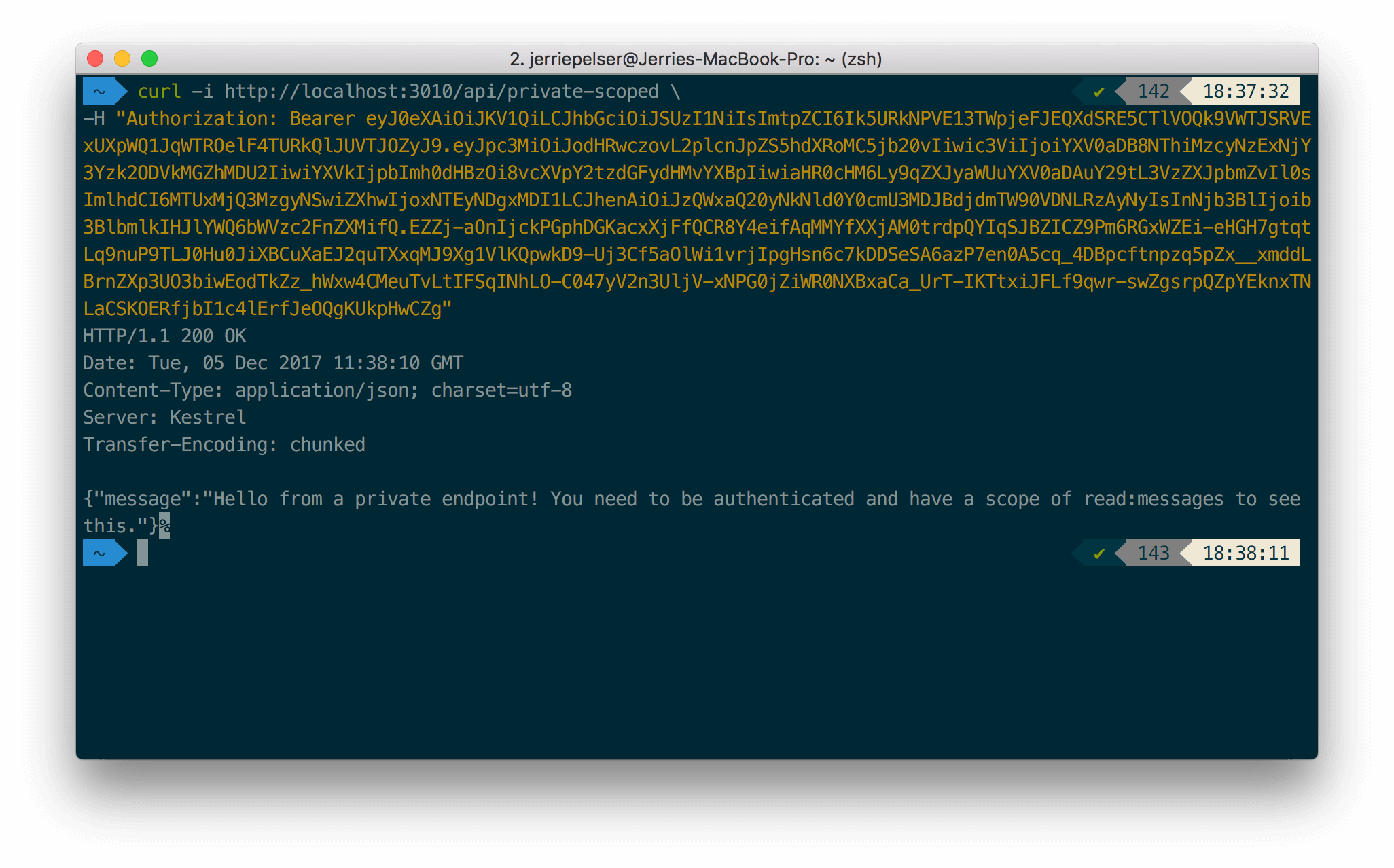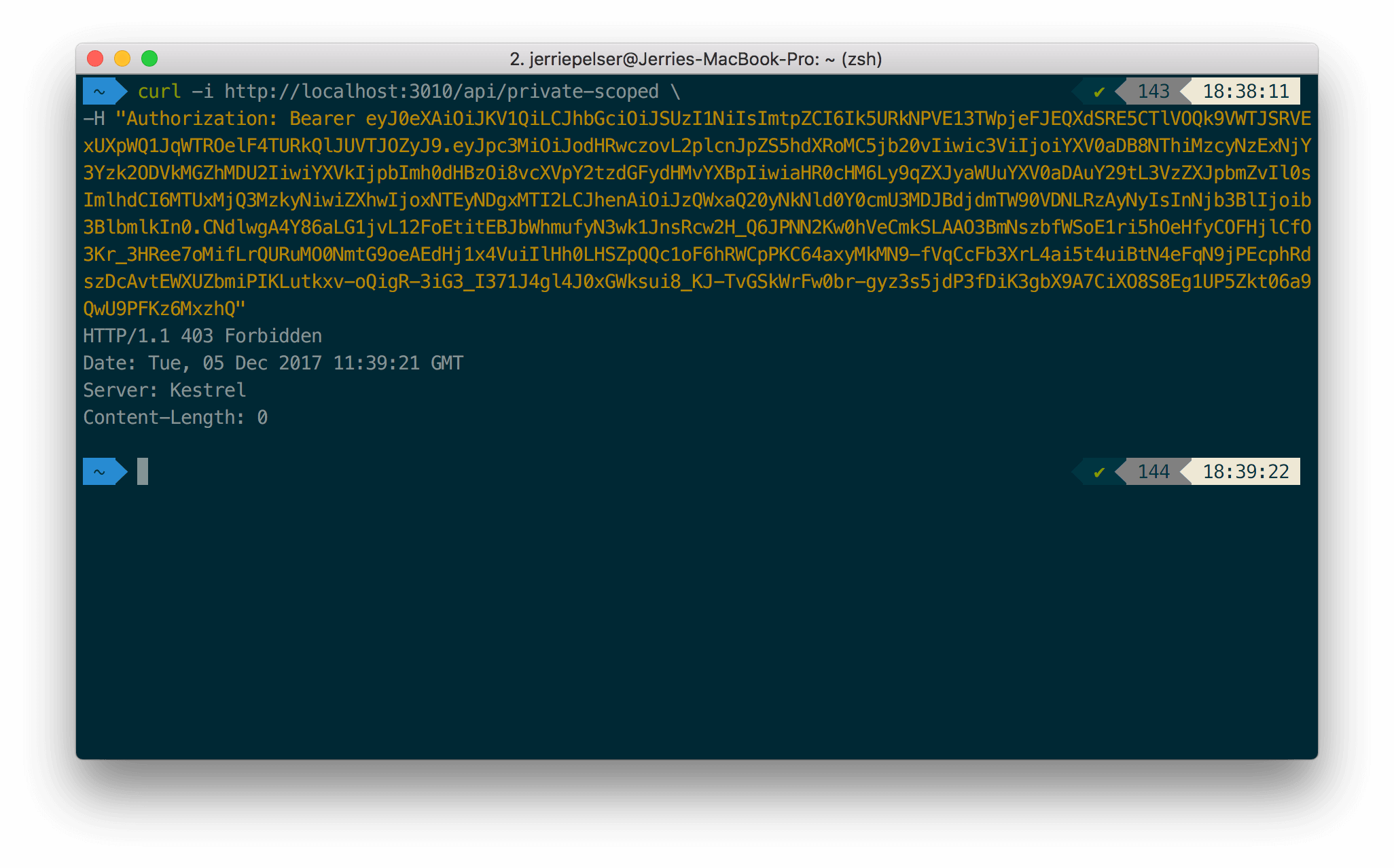ASP.NET Core Web API: Using your API
This tutorial will show you how to use your API. We recommend that you log in to follow this quickstart with examples configured for your account.
Calling the API From Your Application
You can call the API from your application by passing an Access Token in the Authorization header of your HTTP request as a Bearer token.
curl --request GET \
--url http://localhost:3010/api/private \
--header 'authorization: Bearer YOUR_ACCESS_TOKEN'Was this helpful?
var client = new RestClient("http://localhost:3010/api/private");
var request = new RestRequest(Method.GET);
request.AddHeader("authorization", "Bearer YOUR_ACCESS_TOKEN");
IRestResponse response = client.Execute(request);Was this helpful?
package main
import (
"fmt"
"net/http"
"io/ioutil"
)
func main() {
url := "http://localhost:3010/api/private"
req, _ := http.NewRequest("GET", url, nil)
req.Header.Add("authorization", "Bearer YOUR_ACCESS_TOKEN")
res, _ := http.DefaultClient.Do(req)
defer res.Body.Close()
body, _ := ioutil.ReadAll(res.Body)
fmt.Println(res)
fmt.Println(string(body))
}Was this helpful?
HttpResponse<String> response = Unirest.get("http://localhost:3010/api/private")
.header("authorization", "Bearer YOUR_ACCESS_TOKEN")
.asString();Was this helpful?
var axios = require("axios").default;
var options = {
method: 'GET',
url: 'http://localhost:3010/api/private',
headers: {authorization: 'Bearer YOUR_ACCESS_TOKEN'}
};
axios.request(options).then(function (response) {
console.log(response.data);
}).catch(function (error) {
console.error(error);
});Was this helpful?
#import <Foundation/Foundation.h>
NSDictionary *headers = @{ @"authorization": @"Bearer YOUR_ACCESS_TOKEN" };
NSMutableURLRequest *request = [NSMutableURLRequest requestWithURL:[NSURL URLWithString:@"http://localhost:3010/api/private"]
cachePolicy:NSURLRequestUseProtocolCachePolicy
timeoutInterval:10.0];
[request setHTTPMethod:@"GET"];
[request setAllHTTPHeaderFields:headers];
NSURLSession *session = [NSURLSession sharedSession];
NSURLSessionDataTask *dataTask = [session dataTaskWithRequest:request
completionHandler:^(NSData *data, NSURLResponse *response, NSError *error) {
if (error) {
NSLog(@"%@", error);
} else {
NSHTTPURLResponse *httpResponse = (NSHTTPURLResponse *) response;
NSLog(@"%@", httpResponse);
}
}];
[dataTask resume];Was this helpful?
$curl = curl_init();
curl_setopt_array($curl, [
CURLOPT_PORT => "3010",
CURLOPT_URL => "http://localhost:3010/api/private",
CURLOPT_RETURNTRANSFER => true,
CURLOPT_ENCODING => "",
CURLOPT_MAXREDIRS => 10,
CURLOPT_TIMEOUT => 30,
CURLOPT_HTTP_VERSION => CURL_HTTP_VERSION_1_1,
CURLOPT_CUSTOMREQUEST => "GET",
CURLOPT_HTTPHEADER => [
"authorization: Bearer YOUR_ACCESS_TOKEN"
],
]);
$response = curl_exec($curl);
$err = curl_error($curl);
curl_close($curl);
if ($err) {
echo "cURL Error #:" . $err;
} else {
echo $response;
}Was this helpful?
import http.client
conn = http.client.HTTPConnection("localhost:3010")
headers = { 'authorization': "Bearer YOUR_ACCESS_TOKEN" }
conn.request("GET", "/api/private", headers=headers)
res = conn.getresponse()
data = res.read()
print(data.decode("utf-8"))Was this helpful?
require 'uri'
require 'net/http'
url = URI("http://localhost:3010/api/private")
http = Net::HTTP.new(url.host, url.port)
request = Net::HTTP::Get.new(url)
request["authorization"] = 'Bearer YOUR_ACCESS_TOKEN'
response = http.request(request)
puts response.read_bodyWas this helpful?
import Foundation
let headers = ["authorization": "Bearer YOUR_ACCESS_TOKEN"]
let request = NSMutableURLRequest(url: NSURL(string: "http://localhost:3010/api/private")! as URL,
cachePolicy: .useProtocolCachePolicy,
timeoutInterval: 10.0)
request.httpMethod = "GET"
request.allHTTPHeaderFields = headers
let session = URLSession.shared
let dataTask = session.dataTask(with: request as URLRequest, completionHandler: { (data, response, error) -> Void in
if (error != nil) {
print(error)
} else {
let httpResponse = response as? HTTPURLResponse
print(httpResponse)
}
})
dataTask.resume()Was this helpful?
Obtaining an Access Token
If you are calling the API from a Single-Page Application or a Mobile/Native application, after the authorization flow is completed, you will get an Access Token. How you get the token and how you make the call to the API will be dependent on the type of application you are developing and the framework you are using. For more information refer to the relevant application Quickstarts which contain detailed instructions:
If you are calling the API from a command-line tool or another service, where there isn't a user entering their credentials, you need to use the OAuth Client Credentials flow. To do that, register a Machine to Machine Application, and then subsequently use the Client ID and Client Secret of this application when making the request below and pass those along in the client_id and client_secret parameters respectively. Also include the Audience for the API you want to call.
curl --request POST \
--url 'https://{yourDomain}/oauth/token' \
--header 'content-type: application/x-www-form-urlencoded' \
--data grant_type=client_credentials \
--data 'client_id={yourClientId}' \
--data client_secret=YOUR_CLIENT_SECRET \
--data audience=YOUR_API_IDENTIFIERWas this helpful?
var client = new RestClient("https://{yourDomain}/oauth/token");
var request = new RestRequest(Method.POST);
request.AddHeader("content-type", "application/x-www-form-urlencoded");
request.AddParameter("application/x-www-form-urlencoded", "grant_type=client_credentials&client_id=%24%7Baccount.clientId%7D&client_secret=YOUR_CLIENT_SECRET&audience=YOUR_API_IDENTIFIER", ParameterType.RequestBody);
IRestResponse response = client.Execute(request);Was this helpful?
package main
import (
"fmt"
"strings"
"net/http"
"io/ioutil"
)
func main() {
url := "https://{yourDomain}/oauth/token"
payload := strings.NewReader("grant_type=client_credentials&client_id=%24%7Baccount.clientId%7D&client_secret=YOUR_CLIENT_SECRET&audience=YOUR_API_IDENTIFIER")
req, _ := http.NewRequest("POST", url, payload)
req.Header.Add("content-type", "application/x-www-form-urlencoded")
res, _ := http.DefaultClient.Do(req)
defer res.Body.Close()
body, _ := ioutil.ReadAll(res.Body)
fmt.Println(res)
fmt.Println(string(body))
}Was this helpful?
HttpResponse<String> response = Unirest.post("https://{yourDomain}/oauth/token")
.header("content-type", "application/x-www-form-urlencoded")
.body("grant_type=client_credentials&client_id=%24%7Baccount.clientId%7D&client_secret=YOUR_CLIENT_SECRET&audience=YOUR_API_IDENTIFIER")
.asString();Was this helpful?
var axios = require("axios").default;
var options = {
method: 'POST',
url: 'https://{yourDomain}/oauth/token',
headers: {'content-type': 'application/x-www-form-urlencoded'},
data: new URLSearchParams({
grant_type: 'client_credentials',
client_id: '{yourClientId}',
client_secret: 'YOUR_CLIENT_SECRET',
audience: 'YOUR_API_IDENTIFIER'
})
};
axios.request(options).then(function (response) {
console.log(response.data);
}).catch(function (error) {
console.error(error);
});Was this helpful?
#import <Foundation/Foundation.h>
NSDictionary *headers = @{ @"content-type": @"application/x-www-form-urlencoded" };
NSMutableData *postData = [[NSMutableData alloc] initWithData:[@"grant_type=client_credentials" dataUsingEncoding:NSUTF8StringEncoding]];
[postData appendData:[@"&client_id={yourClientId}" dataUsingEncoding:NSUTF8StringEncoding]];
[postData appendData:[@"&client_secret=YOUR_CLIENT_SECRET" dataUsingEncoding:NSUTF8StringEncoding]];
[postData appendData:[@"&audience=YOUR_API_IDENTIFIER" dataUsingEncoding:NSUTF8StringEncoding]];
NSMutableURLRequest *request = [NSMutableURLRequest requestWithURL:[NSURL URLWithString:@"https://{yourDomain}/oauth/token"]
cachePolicy:NSURLRequestUseProtocolCachePolicy
timeoutInterval:10.0];
[request setHTTPMethod:@"POST"];
[request setAllHTTPHeaderFields:headers];
[request setHTTPBody:postData];
NSURLSession *session = [NSURLSession sharedSession];
NSURLSessionDataTask *dataTask = [session dataTaskWithRequest:request
completionHandler:^(NSData *data, NSURLResponse *response, NSError *error) {
if (error) {
NSLog(@"%@", error);
} else {
NSHTTPURLResponse *httpResponse = (NSHTTPURLResponse *) response;
NSLog(@"%@", httpResponse);
}
}];
[dataTask resume];Was this helpful?
$curl = curl_init();
curl_setopt_array($curl, [
CURLOPT_URL => "https://{yourDomain}/oauth/token",
CURLOPT_RETURNTRANSFER => true,
CURLOPT_ENCODING => "",
CURLOPT_MAXREDIRS => 10,
CURLOPT_TIMEOUT => 30,
CURLOPT_HTTP_VERSION => CURL_HTTP_VERSION_1_1,
CURLOPT_CUSTOMREQUEST => "POST",
CURLOPT_POSTFIELDS => "grant_type=client_credentials&client_id=%24%7Baccount.clientId%7D&client_secret=YOUR_CLIENT_SECRET&audience=YOUR_API_IDENTIFIER",
CURLOPT_HTTPHEADER => [
"content-type: application/x-www-form-urlencoded"
],
]);
$response = curl_exec($curl);
$err = curl_error($curl);
curl_close($curl);
if ($err) {
echo "cURL Error #:" . $err;
} else {
echo $response;
}Was this helpful?
import http.client
conn = http.client.HTTPSConnection("")
payload = "grant_type=client_credentials&client_id=%24%7Baccount.clientId%7D&client_secret=YOUR_CLIENT_SECRET&audience=YOUR_API_IDENTIFIER"
headers = { 'content-type': "application/x-www-form-urlencoded" }
conn.request("POST", "/{yourDomain}/oauth/token", payload, headers)
res = conn.getresponse()
data = res.read()
print(data.decode("utf-8"))Was this helpful?
require 'uri'
require 'net/http'
require 'openssl'
url = URI("https://{yourDomain}/oauth/token")
http = Net::HTTP.new(url.host, url.port)
http.use_ssl = true
http.verify_mode = OpenSSL::SSL::VERIFY_NONE
request = Net::HTTP::Post.new(url)
request["content-type"] = 'application/x-www-form-urlencoded'
request.body = "grant_type=client_credentials&client_id=%24%7Baccount.clientId%7D&client_secret=YOUR_CLIENT_SECRET&audience=YOUR_API_IDENTIFIER"
response = http.request(request)
puts response.read_bodyWas this helpful?
import Foundation
let headers = ["content-type": "application/x-www-form-urlencoded"]
let postData = NSMutableData(data: "grant_type=client_credentials".data(using: String.Encoding.utf8)!)
postData.append("&client_id={yourClientId}".data(using: String.Encoding.utf8)!)
postData.append("&client_secret=YOUR_CLIENT_SECRET".data(using: String.Encoding.utf8)!)
postData.append("&audience=YOUR_API_IDENTIFIER".data(using: String.Encoding.utf8)!)
let request = NSMutableURLRequest(url: NSURL(string: "https://{yourDomain}/oauth/token")! as URL,
cachePolicy: .useProtocolCachePolicy,
timeoutInterval: 10.0)
request.httpMethod = "POST"
request.allHTTPHeaderFields = headers
request.httpBody = postData as Data
let session = URLSession.shared
let dataTask = session.dataTask(with: request as URLRequest, completionHandler: { (data, response, error) -> Void in
if (error != nil) {
print(error)
} else {
let httpResponse = response as? HTTPURLResponse
print(httpResponse)
}
})
dataTask.resume()Was this helpful?
For testing purposes, you can also get an Access Token from the Test tab in your API settings.
Test Your API
1. Calling the secure endpoint
You can make a request to the /api/private endpoint without passing any Access Token:
curl --request GET \
--url http://localhost:3010/api/privateWas this helpful?
var client = new RestClient("http://localhost:3010/api/private");
var request = new RestRequest(Method.GET);
IRestResponse response = client.Execute(request);Was this helpful?
package main
import (
"fmt"
"net/http"
"io/ioutil"
)
func main() {
url := "http://localhost:3010/api/private"
req, _ := http.NewRequest("GET", url, nil)
res, _ := http.DefaultClient.Do(req)
defer res.Body.Close()
body, _ := ioutil.ReadAll(res.Body)
fmt.Println(res)
fmt.Println(string(body))
}Was this helpful?
HttpResponse<String> response = Unirest.get("http://localhost:3010/api/private")
.asString();Was this helpful?
var axios = require("axios").default;
var options = {method: 'GET', url: 'http://localhost:3010/api/private'};
axios.request(options).then(function (response) {
console.log(response.data);
}).catch(function (error) {
console.error(error);
});Was this helpful?
#import <Foundation/Foundation.h>
NSMutableURLRequest *request = [NSMutableURLRequest requestWithURL:[NSURL URLWithString:@"http://localhost:3010/api/private"]
cachePolicy:NSURLRequestUseProtocolCachePolicy
timeoutInterval:10.0];
[request setHTTPMethod:@"GET"];
NSURLSession *session = [NSURLSession sharedSession];
NSURLSessionDataTask *dataTask = [session dataTaskWithRequest:request
completionHandler:^(NSData *data, NSURLResponse *response, NSError *error) {
if (error) {
NSLog(@"%@", error);
} else {
NSHTTPURLResponse *httpResponse = (NSHTTPURLResponse *) response;
NSLog(@"%@", httpResponse);
}
}];
[dataTask resume];Was this helpful?
$curl = curl_init();
curl_setopt_array($curl, [
CURLOPT_PORT => "3010",
CURLOPT_URL => "http://localhost:3010/api/private",
CURLOPT_RETURNTRANSFER => true,
CURLOPT_ENCODING => "",
CURLOPT_MAXREDIRS => 10,
CURLOPT_TIMEOUT => 30,
CURLOPT_HTTP_VERSION => CURL_HTTP_VERSION_1_1,
CURLOPT_CUSTOMREQUEST => "GET",
]);
$response = curl_exec($curl);
$err = curl_error($curl);
curl_close($curl);
if ($err) {
echo "cURL Error #:" . $err;
} else {
echo $response;
}Was this helpful?
import http.client
conn = http.client.HTTPConnection("localhost:3010")
conn.request("GET", "/api/private")
res = conn.getresponse()
data = res.read()
print(data.decode("utf-8"))Was this helpful?
require 'uri'
require 'net/http'
url = URI("http://localhost:3010/api/private")
http = Net::HTTP.new(url.host, url.port)
request = Net::HTTP::Get.new(url)
response = http.request(request)
puts response.read_bodyWas this helpful?
import Foundation
let request = NSMutableURLRequest(url: NSURL(string: "http://localhost:3010/api/private")! as URL,
cachePolicy: .useProtocolCachePolicy,
timeoutInterval: 10.0)
request.httpMethod = "GET"
let session = URLSession.shared
let dataTask = session.dataTask(with: request as URLRequest, completionHandler: { (data, response, error) -> Void in
if (error != nil) {
print(error)
} else {
let httpResponse = response as? HTTPURLResponse
print(httpResponse)
}
})
dataTask.resume()Was this helpful?
The API will return a 401 HTTP (Unauthorized) status code:

Once again, make the same request but this time pass along the Access Token as a Bearer token in the Authorization header of the request:
curl --request GET \
--url http://localhost:3010/api/private \
--header 'authorization: Bearer YOUR_ACCESS_TOKEN'Was this helpful?
var client = new RestClient("http://localhost:3010/api/private");
var request = new RestRequest(Method.GET);
request.AddHeader("authorization", "Bearer YOUR_ACCESS_TOKEN");
IRestResponse response = client.Execute(request);Was this helpful?
package main
import (
"fmt"
"net/http"
"io/ioutil"
)
func main() {
url := "http://localhost:3010/api/private"
req, _ := http.NewRequest("GET", url, nil)
req.Header.Add("authorization", "Bearer YOUR_ACCESS_TOKEN")
res, _ := http.DefaultClient.Do(req)
defer res.Body.Close()
body, _ := ioutil.ReadAll(res.Body)
fmt.Println(res)
fmt.Println(string(body))
}Was this helpful?
HttpResponse<String> response = Unirest.get("http://localhost:3010/api/private")
.header("authorization", "Bearer YOUR_ACCESS_TOKEN")
.asString();Was this helpful?
var axios = require("axios").default;
var options = {
method: 'GET',
url: 'http://localhost:3010/api/private',
headers: {authorization: 'Bearer YOUR_ACCESS_TOKEN'}
};
axios.request(options).then(function (response) {
console.log(response.data);
}).catch(function (error) {
console.error(error);
});Was this helpful?
#import <Foundation/Foundation.h>
NSDictionary *headers = @{ @"authorization": @"Bearer YOUR_ACCESS_TOKEN" };
NSMutableURLRequest *request = [NSMutableURLRequest requestWithURL:[NSURL URLWithString:@"http://localhost:3010/api/private"]
cachePolicy:NSURLRequestUseProtocolCachePolicy
timeoutInterval:10.0];
[request setHTTPMethod:@"GET"];
[request setAllHTTPHeaderFields:headers];
NSURLSession *session = [NSURLSession sharedSession];
NSURLSessionDataTask *dataTask = [session dataTaskWithRequest:request
completionHandler:^(NSData *data, NSURLResponse *response, NSError *error) {
if (error) {
NSLog(@"%@", error);
} else {
NSHTTPURLResponse *httpResponse = (NSHTTPURLResponse *) response;
NSLog(@"%@", httpResponse);
}
}];
[dataTask resume];Was this helpful?
$curl = curl_init();
curl_setopt_array($curl, [
CURLOPT_PORT => "3010",
CURLOPT_URL => "http://localhost:3010/api/private",
CURLOPT_RETURNTRANSFER => true,
CURLOPT_ENCODING => "",
CURLOPT_MAXREDIRS => 10,
CURLOPT_TIMEOUT => 30,
CURLOPT_HTTP_VERSION => CURL_HTTP_VERSION_1_1,
CURLOPT_CUSTOMREQUEST => "GET",
CURLOPT_HTTPHEADER => [
"authorization: Bearer YOUR_ACCESS_TOKEN"
],
]);
$response = curl_exec($curl);
$err = curl_error($curl);
curl_close($curl);
if ($err) {
echo "cURL Error #:" . $err;
} else {
echo $response;
}Was this helpful?
import http.client
conn = http.client.HTTPConnection("localhost:3010")
headers = { 'authorization': "Bearer YOUR_ACCESS_TOKEN" }
conn.request("GET", "/api/private", headers=headers)
res = conn.getresponse()
data = res.read()
print(data.decode("utf-8"))Was this helpful?
require 'uri'
require 'net/http'
url = URI("http://localhost:3010/api/private")
http = Net::HTTP.new(url.host, url.port)
request = Net::HTTP::Get.new(url)
request["authorization"] = 'Bearer YOUR_ACCESS_TOKEN'
response = http.request(request)
puts response.read_bodyWas this helpful?
import Foundation
let headers = ["authorization": "Bearer YOUR_ACCESS_TOKEN"]
let request = NSMutableURLRequest(url: NSURL(string: "http://localhost:3010/api/private")! as URL,
cachePolicy: .useProtocolCachePolicy,
timeoutInterval: 10.0)
request.httpMethod = "GET"
request.allHTTPHeaderFields = headers
let session = URLSession.shared
let dataTask = session.dataTask(with: request as URLRequest, completionHandler: { (data, response, error) -> Void in
if (error != nil) {
print(error)
} else {
let httpResponse = response as? HTTPURLResponse
print(httpResponse)
}
})
dataTask.resume()Was this helpful?
This time the API will return a successful response:

2. Testing the scoped endpoint
To test the endpoint that requires a scope, pass the Access Token containing the correct scope as a Bearer token in the Authorization header:
curl --request GET \
--url http://localhost:3010/api/private-scoped \
--header 'authorization: Bearer YOUR_ACCESS_TOKEN'Was this helpful?
var client = new RestClient("http://localhost:3010/api/private-scoped");
var request = new RestRequest(Method.GET);
request.AddHeader("authorization", "Bearer YOUR_ACCESS_TOKEN");
IRestResponse response = client.Execute(request);Was this helpful?
package main
import (
"fmt"
"net/http"
"io/ioutil"
)
func main() {
url := "http://localhost:3010/api/private-scoped"
req, _ := http.NewRequest("GET", url, nil)
req.Header.Add("authorization", "Bearer YOUR_ACCESS_TOKEN")
res, _ := http.DefaultClient.Do(req)
defer res.Body.Close()
body, _ := ioutil.ReadAll(res.Body)
fmt.Println(res)
fmt.Println(string(body))
}Was this helpful?
HttpResponse<String> response = Unirest.get("http://localhost:3010/api/private-scoped")
.header("authorization", "Bearer YOUR_ACCESS_TOKEN")
.asString();Was this helpful?
var axios = require("axios").default;
var options = {
method: 'GET',
url: 'http://localhost:3010/api/private-scoped',
headers: {authorization: 'Bearer YOUR_ACCESS_TOKEN'}
};
axios.request(options).then(function (response) {
console.log(response.data);
}).catch(function (error) {
console.error(error);
});Was this helpful?
#import <Foundation/Foundation.h>
NSDictionary *headers = @{ @"authorization": @"Bearer YOUR_ACCESS_TOKEN" };
NSMutableURLRequest *request = [NSMutableURLRequest requestWithURL:[NSURL URLWithString:@"http://localhost:3010/api/private-scoped"]
cachePolicy:NSURLRequestUseProtocolCachePolicy
timeoutInterval:10.0];
[request setHTTPMethod:@"GET"];
[request setAllHTTPHeaderFields:headers];
NSURLSession *session = [NSURLSession sharedSession];
NSURLSessionDataTask *dataTask = [session dataTaskWithRequest:request
completionHandler:^(NSData *data, NSURLResponse *response, NSError *error) {
if (error) {
NSLog(@"%@", error);
} else {
NSHTTPURLResponse *httpResponse = (NSHTTPURLResponse *) response;
NSLog(@"%@", httpResponse);
}
}];
[dataTask resume];Was this helpful?
$curl = curl_init();
curl_setopt_array($curl, [
CURLOPT_PORT => "3010",
CURLOPT_URL => "http://localhost:3010/api/private-scoped",
CURLOPT_RETURNTRANSFER => true,
CURLOPT_ENCODING => "",
CURLOPT_MAXREDIRS => 10,
CURLOPT_TIMEOUT => 30,
CURLOPT_HTTP_VERSION => CURL_HTTP_VERSION_1_1,
CURLOPT_CUSTOMREQUEST => "GET",
CURLOPT_HTTPHEADER => [
"authorization: Bearer YOUR_ACCESS_TOKEN"
],
]);
$response = curl_exec($curl);
$err = curl_error($curl);
curl_close($curl);
if ($err) {
echo "cURL Error #:" . $err;
} else {
echo $response;
}Was this helpful?
import http.client
conn = http.client.HTTPConnection("localhost:3010")
headers = { 'authorization': "Bearer YOUR_ACCESS_TOKEN" }
conn.request("GET", "/api/private-scoped", headers=headers)
res = conn.getresponse()
data = res.read()
print(data.decode("utf-8"))Was this helpful?
require 'uri'
require 'net/http'
url = URI("http://localhost:3010/api/private-scoped")
http = Net::HTTP.new(url.host, url.port)
request = Net::HTTP::Get.new(url)
request["authorization"] = 'Bearer YOUR_ACCESS_TOKEN'
response = http.request(request)
puts response.read_bodyWas this helpful?
import Foundation
let headers = ["authorization": "Bearer YOUR_ACCESS_TOKEN"]
let request = NSMutableURLRequest(url: NSURL(string: "http://localhost:3010/api/private-scoped")! as URL,
cachePolicy: .useProtocolCachePolicy,
timeoutInterval: 10.0)
request.httpMethod = "GET"
request.allHTTPHeaderFields = headers
let session = URLSession.shared
let dataTask = session.dataTask(with: request as URLRequest, completionHandler: { (data, response, error) -> Void in
if (error != nil) {
print(error)
} else {
let httpResponse = response as? HTTPURLResponse
print(httpResponse)
}
})
dataTask.resume()Was this helpful?
If the required scope is present, the API call is successful:

If the required scope is not present, the API returns a 403 HTTP Status (Forbidden):
